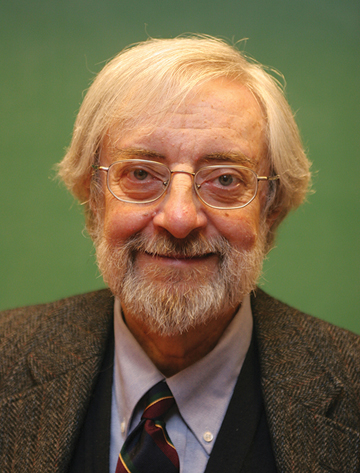“One of a Vanishing Breed”—Ed Fuller
 After 35 years at the College, Edward “Ed” Fuller, McCabe Library’s eccentric but endearing reference and video resources librarian, has retired. Ask him how he intends to spend his days from now on, and he may answer that he’d like to try his hand at writing or sculpting. But he’s just as likely to respond: “I’m thinking of opening a reference desk in Dunkin’ Donuts and telling people about the difference between Dunkin’ Donuts and Duncan Phyfe. Or maybe someone will come in and want to know how many rivets there are in the Eiffel Tower, or who won the World Series in 1950, or when the Wars of the Roses ended.” He sighs, drifting dreamily into his characteristic quote-for-any-occasion mode—“Aah, ‘A horse, a horse, my kingdom for a horse.…’ That’s Shakespeare’s Richard III, you know.”
After 35 years at the College, Edward “Ed” Fuller, McCabe Library’s eccentric but endearing reference and video resources librarian, has retired. Ask him how he intends to spend his days from now on, and he may answer that he’d like to try his hand at writing or sculpting. But he’s just as likely to respond: “I’m thinking of opening a reference desk in Dunkin’ Donuts and telling people about the difference between Dunkin’ Donuts and Duncan Phyfe. Or maybe someone will come in and want to know how many rivets there are in the Eiffel Tower, or who won the World Series in 1950, or when the Wars of the Roses ended.” He sighs, drifting dreamily into his characteristic quote-for-any-occasion mode—“Aah, ‘A horse, a horse, my kingdom for a horse.…’ That’s Shakespeare’s Richard III, you know.”
Fuller’s initial application for employment at the College was for a development-writing job. He was rejected because, he says, he was unwilling to commit to the job forever. But four months later, a call from the head of personnel led to a job in the library, sorting mail and performing “other duties as required.” After several promotions and a master’s in library science from Drexel University, he became McCabe’s reference librarian.
“It seems as if I never really decided to do this,” he says. “It was just a happy chance. Sometimes, it seems as if I should have selected something, that I should not have let a stochastic event, a random variable, govern most of my life. But I loved it. I still do. There’s a kind of ego gratification in people coming and asking for your help on intellectual topics and other things.”
He says that after doing the same thing in the same place for more or less 35 years, he’s having difficulty breaking the habit. “Now, I hear someone ask a question, and I automatically start to answer—even though I may be wrong. But I’ve never let ignorance hinder my tongue,” he jokes.
College Librarian Peggy Seiden says: “Ed is one of a vanishing breed of librarians; the kind who knew the collection inside out, who could not only take you to the area of the library where you might find an answer to your question, but who often could take you to a specific title.”
After three or four weeks of clearing and sorting what he refers to as “35 years worth of accumulated neglect,” Fuller’s office is empty. He has piled up the items he wishes to keep—mainly for sentimental reasons—outside his door, “mess-merizing” his colleagues, he says. But, he adds: “If you have to transport or carry something, its sentimental value evaporates. Your attitude changes according to whether the item is suspended by your heartstrings or by the end of your arm. I’ve become tremendously ruthless about my books, but I’ve got so many that even being ruthless hardly suffices. I may sell some. I’ve been giving stuff away right and left.”
In retirement, Fuller will still be able to spend time in the library, writing and researching in the carrel that was formerly occupied by the late William R. Kenan Jr. Professor Emeritus of Classics Martin Ostwald, who died in April.
“It’s an extraordinary honor,” Fuller says. “Martin was a wonderful man, and when he spoke of classics, you knew why it had survived.” Fuller would like the library’s balcony lounge to be named after Ostwald, “because it has a panoptic view of the campus, and Martin’s view of classics was like that.”
Summing up his long tenure at the College, Fuller muses: “I hope that in some small way I’ve made a difference to someone who will make life better in a big way. It’s been a good 35 years, and I’m glad I did it.”
 Email This Page
Email This Page